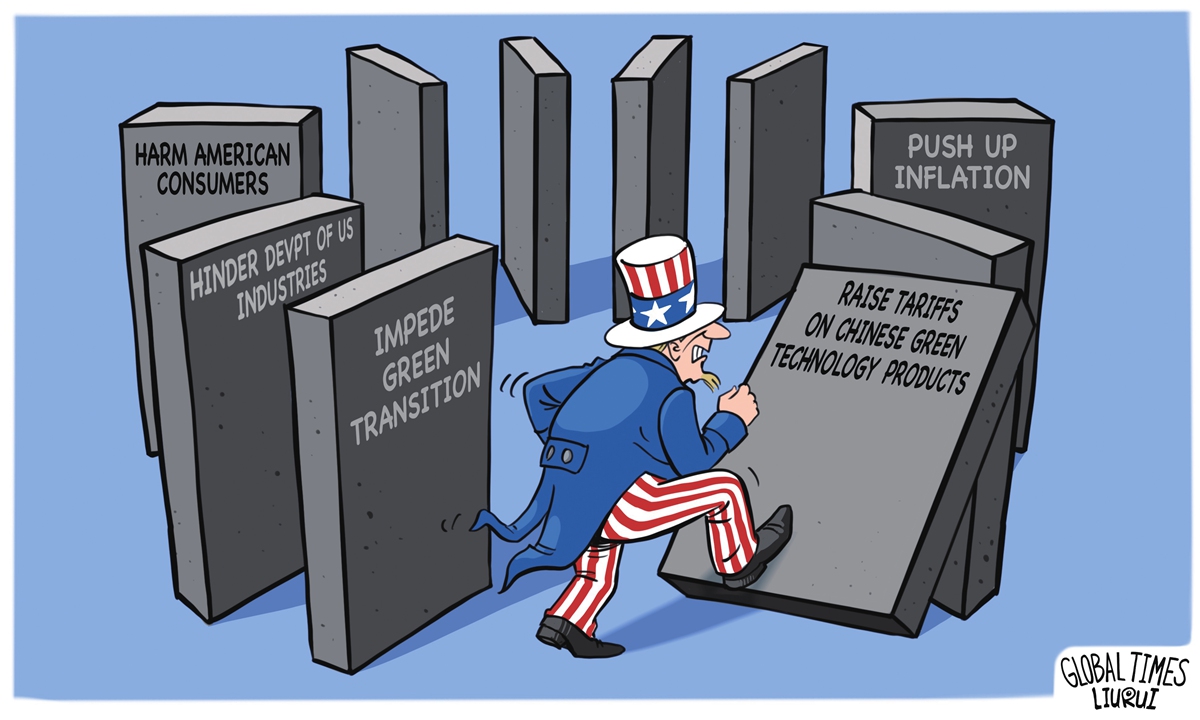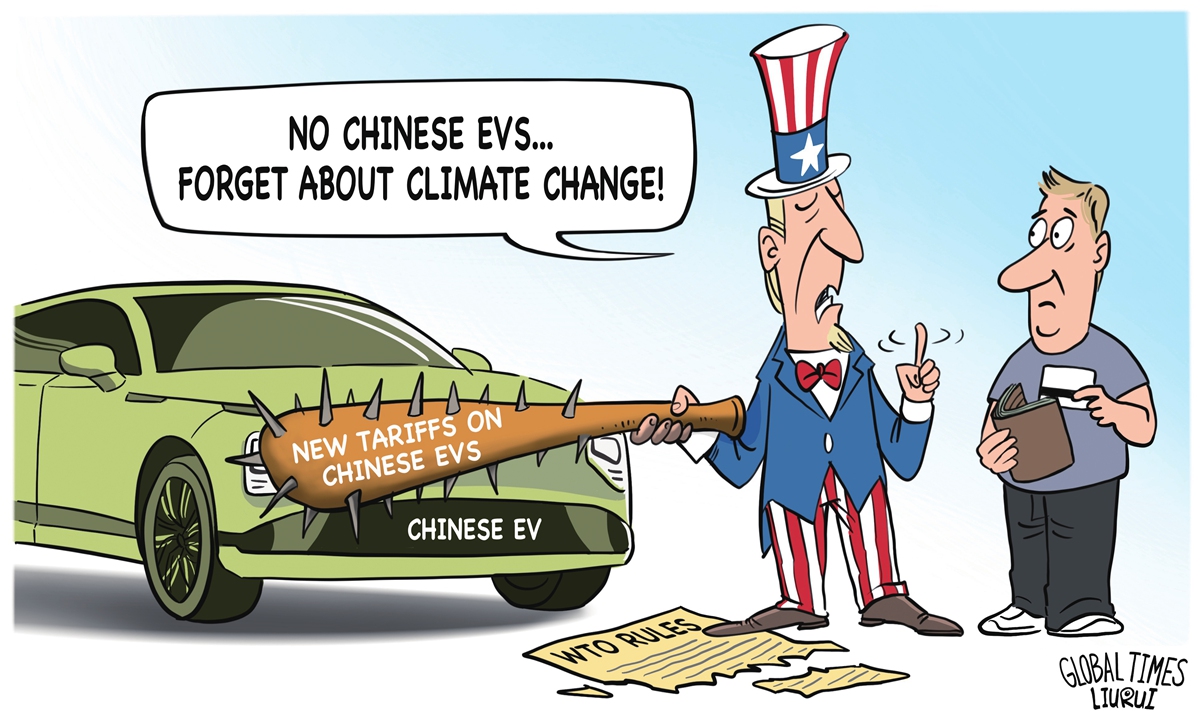
Self-harm. Illustration: Liu Rui/GT

Students from Muscatine High School experience flying a paper kite during a class at Shijiazhuang Foreign Language School in Shijiazhuang, North China’s Hebei Province, on April 20, 2024. Photo: VCG
Editor’s Note:
The youth are the vanguards of our time, showcasing boundless energy and vibrant personalities.
Gen-Zers not only represent the makers of the future but also serve as agents of change in the present. With an open mindset and an international outlook, they actively integrate into the currents of globalization, engaging in deep exchanges, and collaborating with youth from around the world to explore pathways and strategies to address global challenges.
The Global Times has launched the “Voice from Gen Z” series, which focuses on the proactive actions and innovative achievements of young people in areas such as global governance, cultural exchange, environmental protection, and technological innovation. Through this column, we aim to showcase the unique charm and future leadership of global Gen-Zers.
“The youth of China and the US should continue to build strong friendships, improving their understanding of each other, and their countries. This will help lead citizens around the world to interact and communicate with each other.” This sentiment was solemnly shared by 17-year-old Colin Millage from Muscatine High School from the US state of Iowa, as he returned to the country after an 8-day study tour in China in late April.
The study tour delegation is called “Inheritance of Friendship,” which is part of a China-initiated program that invites 50,000 US youth to China within five years for exchanges and study. The delegation is the second batch from the school.
With all 32 members of Generation Z who came to China for the first time, they embarked on the journey with curiosity about China and a desire to fully embrace the country and its people. Touched by the sincere interactions between the people of China and the US, they are committed to carrying forward friendship in their own way.
Millage believes that their trip can serve as an example to young people, showing that friendships between countries can lead the world in the right direction toward peace and stability.
“We are the future. It’s important for the youth all over the world to connect for a better future. I expect there will be many more exchanges between the two countries,” Millage’s fellow Skye Foster, a 10th-grade student, also shared with the Global Times.
‘Beautiful first impression’
With the dazzling light effects, innovative stage design and imaginative program arrangement, the welcome performance titled “Chinese Impressions” by students from Shijiazhuang Foreign Language School on the evening of April 19 in Shijiazhuang, North China’s Hebei Province, left a lasting impression on Millage.
“It gave me a beautiful first impression,” Millage said, referring to the exquisite performance of his Chinese peers and the profound Chinese culture embedded in the program.
American Gen Zers are always eager to experience different cultures. For example, Foster noted she chose to participate in the school trip to China because she loved learning Chinese.
During the journey, the delegation visited Beijing, Hebei, and Shanghai. They wore traditional Hanfu, climbed the Great Wall, visited the Forbidden City, and explored the Xiong’an New Area. They tasted traditional local cuisine, learned to pay for services using mobile phone QR codes, experiencing a real, comprehensive China that blends the classical and the modern.
In Millage’s opinion, China is a country filled with deep culture and history. From the intricate architecture to the meaningful cultural practices, the country beautifully presents itself with an influential cultural identity.
“China is a very big country. There is so much to learn about China. There’s so much to see and I had a great experience there,” Foster said.
“Sending the second study tour delegation to China in such a short period of time shows how successful the first group’s trip to China was,” Ryan Scott Castle, principal of Muscatine High School, told the Global Times. He mentioned that many students who had previously visited China signed up again for the second research group and he had to use his authority as principal to “keep them in the US” because more and more students from Muscatine are eager to explore China.
“Before departure, I told the kids: As soon as the plane lands, put away your phones, absorb like a sponge, breathe in the air of China, enjoy the food of China, seize every opportunity to communicate with the people around you… Since you are in China, embrace it with your whole heart,” said Luca Berrone, Chairman of the Muscatine-China Initiatives Committee, who accompanied the delegation to China.
To Berrone’s relief, the teenagers did just that. Millage said he would tell all his family and friends that China should be their next vacation.
Millage noted that some media sources in the US made China out to be restrictive on some level, but he thought that mainly stems from the US’ superiority complex about being “the most free country” when most other countries are also free.
“After being in China, I completely disagree with any portrayal of the country being restrictive… While some Americans may be cautious when visiting the country due to negatively preconceived notions, they should look past that and appreciate the beauty the country can offer,” he stressed.
Exemplary tales of exchanges

Students from Muscatine High School learn Chinese calligraphy at Shijiazhuang Foreign Language School on April 21, 2024. Photo: VCG
Hebei Province and the Iowa State signed their sister-state relationship in 1983. For over 40 years, Hebei and Iowa have written many exemplary tales of friendly exchanges.
In the spring of 1985, Chinese President Xi Jinping, at that time a county leader in Zhengding, Hebei Province, took his initial steps on US soil. From then on, Xi never forgot his American friends and believes that people hold the key to state-to-state relations.
Now, this friendship is being further strengthened with new initiatives.
For Foster, her most memorable experience in China was going to her Chinese partner’s home and spending more time with her.
As the host school for the US students, the Shijiazhuang Foreign Language School requested students from China and the US to form one-on-one friendly partnerships. They studied Chinese poetry, played table tennis, and each US student also visited the home of his or her Chinese partner and had dinner together.
“The teachers were very kind and caring. The students were so welcoming and nice,” Foster said.
More importantly, these young people from China and the US have the opportunity to sit together and listen to their elders tell stories of the sincere interactions between the two countries throughout history.
Berrone, who was involved in Xi’s first visit to the US, still remembered the first dinner that the Hebei delegation led by Xi had in Iowa, which was a traditional American “potluck dinner,” at which each family brought a dish to share.
The delegation immediately blended in with the local residents, Berrone recalled. “Meeting for the first time, local residents were also very excited and attracted to them, wanting to know more about Hebei and China,” he said.
American Gen Zers also value the ties of friendship; they were encouraged by the stories of the elderly generation. “They taught me to cherish these bonds, especially cherish those with Chinese partners that span thousands of miles,” Millage said. “American and Chinese people speak different languages and have different cultures, however, Chinese people are hospitable, and so are we.”
During his trip to China, Millage and his friends exchanged their ideals and looked forward to becoming closer friends, growing together to become better individuals.
“Ultimately, both countries should look toward to these similarities to find common ground and build a stronger relationship,” he said.


Abusing tariffs. Illustration: Liu Rui/GT
According to multiple Western media outlets citing a “person familiar with the plan,” the US government is expected to announce as early as May 14 that it will increase the tariff on Chinese electric vehicles (EVs) from the current 25 percent to 100 percent, and impose new tariffs on other Chinese goods including semiconductors and medical supplies. The White House declined to comment. The US side is currently reviewing the tariffs on Chinese goods imposed during the Donald Trump era. Chinese new energy products represented by EVs have garnered particular attention. However, it’s generally believed that considering the “almost zero” number of EVs exported from China to the US, even if the new tariffs are implemented, they are unlikely to immediately impact Chinese electric car companies. What the US will do next matters more about a portrayal of its own national reputation.
The US claims it is founded on free trade. Imposing a 100 percent tariff on goods from other countries, regardless of the reasons, is a clear violation of WTO rules and the spirit of free trade. If appealed to the WTO for arbitration, the US will definitely lose the case and face condemnation from the international community. However, many major international media outlets, including those in the US, actually believe that the US would do such a thing based on a few words from the “person familiar with the plan,” which reflects the US’ current global image. If such damaging incidents to international reputation occurred in any other countries, the government would be expected to firmly clarify, but the White House remains silent. All these strange occurrences have become “normal” when it comes to the US, further highlighting the abnormality of the current US policy direction.
The US has been launching a public opinion offensive against China’s new energy industry under the pretext of “overcapacity” for several months, and news of tariff increases has been spreading in waves. Several US media outlets have revealed that there is “serious disagreement” within the US domestic and even government on whether to adjust tariffs, and they are facing opposition from global public opinion. The CEO of Stellantis, the parent company of Maserati, Carlos Tavares, previously said that “I’m not asking for any kind of protection, because anyway, we are a global company, so I will not be protected everywhere.” The Wall Street Journal also pointed out that trying to bar the most affordable electric vehicles from the US market will put pressure on another Biden administration goal: reducing carbon emissions. American analysts, industry unions, and others have warned that this “power game” instigated by Washington will not only harm the US economy but may also provoke retaliation from China.
Some analysts believe that in addition to domestic political considerations, if the US really imposes high tariffs, it also intends to put pressure on the EU at this moment. Some former US government officials also stated that they want to involve developing countries such as Brazil and India with the US to do so. If the US really does this, it will harm the interests of the whole world, not only infringing on the free trade rights of other countries, but also depriving the “Global South” countries of their green development rights, especially considering the contribution of China’s new energy industry to global green transformation, especially to the “Global South” countries.
Looking at it from a different perspective, can high tariffs and trade barriers really protect the US automotive industry? The US steel industry is a case in point. As early as 2017, when the US issued antidumping and countervailing duty orders on imports of stainless steel sheet and strip from China, the Global Times pointed out in an article that China’s steel exports to the US are insignificant, and the root of the US steel industry’s problems lies not in so-called “unfair competition” or lack of sufficient protection, but in its long-standing monopoly position and lack of emphasis on relying on technological progress to improve production efficiency. What the US steel industry really needs is reform through openness, and trade protection will only enhance corporate inertia. Indeed, late last year, the giant company U.S. Steel Corporation, which provided steel for the Empire State Building in New York, accepted acquisition by a Japanese company. Has protectionism indeed protected the US steel industry? Or has it turned into a political bubble? If Washington still wants to replicate the “protection” path, then the fate of the steel industry today may be the fate of the US automotive industry tomorrow.
In fact, there is no lack of good news between China and the US. A meeting of the US-China Working Group on Enhancing Climate Action in the 2020s was recently held in Washington. The US representative John Podesta said that there is no country more important than China and the US to lead us forward. Larry Marshall, the former chief executive of CSIRO, Australia’s national scientific research agency, also said that the world needs a “climate armistice” between the US and China if net zero emissions are to be reached. In fact, American car companies are “looking for electric vehicle allies in China,” and Tesla is a good example. Whether to step into the river of protectionism again or embrace the trend of win-win cooperation, the issue of tariffs on China is a touchstone for Washington.

Pro-Palestinian supporters and students from Emerson College block an alley where they have set up an encampment as police move in to clear it in Boston, Massachusetts, on April 25, 2024. According to Boston Police, 108 people were arrested and 4 officers were hurt as they broke up the camp. Photo: VCG
The law enforcement actions on peaceful demonstrators, and sometimes on passersby, have exacerbated the tension rather than appease the situation, with analysts underscoring the hypocrisy of US democracy and human rights.
At the prestigious Sciences Po University in Paris, a sit-in by students was seen as an intensifying expression of pro-Palestine sentiment, according to media reports.
“Students were inspired by what’s happening in several American campuses, whether it’s Columbia or Harvard,” a student at the scene told Abu Dhabi-based the National News.
Similar protests were held on British campuses including the University College London, per media reports.
Renewed clashes between police and students opposed to the Biden administration’s support for Israel’s war in Gaza have broken out again after the mass arrests at Columbia University last week. A Reuters tally said that nearly 550 arrests were made across major US universities.
Columbia has switched to hybrid learning and some universities and the University of Southern California have canceled the grand commencement ceremony set for May 10, according to Washington Times.
Footage showing police officers kneeling on protesters, and sometimes passersby, has gone viral on social media platforms. Reuters reported that police have deployed tasers and tear gas against student protesters at Atlanta’s Emory University.
US Senator Josh Hawley had demanded the mobilization of the National Guard to calm the situation, but concerns are mounting that such a move would also backfire, just as the law enforcement actions at Columbia triggered more protests nationwide.
Analysts said such anti-War protests are the natural result of the widening discrepancy between the US’ continuous support for Israel in the Gaza war and public sentiment and belief in basic human rights and democracy.
The Biden administration is in a dilemma, as a shift on policy regarding Israel is unfeasible while continuing the support means a high possibility of more widespread and more violent protests, Lü Xiang, research fellow at the Chinese Academy of Social Sciences, told the Global Times.
US State Department Arabic language spokesperson Hala Rharrit, after serving in the department for almost two decades, resigned in opposition to the US’ Gaza policy, becoming at least the third resignation from the department over the issue, per media reports.
The raging domestic protests and similar international actions proved the isolation and unpopularity of the US’ stance over the issue, and the treatment of student protesters exposed the hypocrisy of the US government over democracy and human rights, experts said.
Since this round of the Israeli-Palestinian conflict, more than 34,000 Palestinians, mostly women and children, have been killed by Israel’s retaliation to a Hamas attack on October 7, 2023 which killed 1,139 on the Israeli side.

Protesters gather as a man holds up a sign demanding that US troops leave Niger without negotiation during a demonstration in Niamey, on April 13, 2024. Photo: VCG
On April 22, the US announced that it had begun discussions with the military government of Niger regarding the withdrawal of American troops from the country. In March of this year, Niger suddenly requested that the US withdraw its troops, making it the latest in a series of West African and Sahel region countries to make such requests to Western countries.
Previously, France had been asked to withdraw its troops from countries such as Mali and Burkina Faso. Many European and American think tanks and media outlets expressed their concerns that this may lead to a significant decrease in Western influence in the Sahel region, allowing Russia to take advantage of the situation. Some research institutions even claimed that Western influence in the Sahel region has already “collapsed.” So, how many troops do Western countries currently have deployed in the region? Why are countries in the Sahel region asking these troops to leave? And can Russian forces replace them?
‘US army, go home’
“This is Agadez, not Washington. US army, go home!” On April 21, in the northern town of Agadez, home to a US air base, protesters held up a large banner demanding the withdrawal of US troops from Niger. Hundreds of people participated in the protest, with the organizer, Issouf Emoud, telling AFP, “Our message is clear: American soldiers, pack your bags and go home.”
The day after the protest, on April 22, Pentagon spokesperson Pat Ryder announced that Washington had begun discussions with the military government of Niger regarding the withdrawal of American troops from the country. The Pentagon plans to send a small delegation to Niger for talks, including members of the US Africa Command, but a timeline for the withdrawal has not been determined.
According to media reports, the US has a military presence in several African countries. After the September 11, 2001 attacks, the US increased its military footprint in Africa. In 2007, the US Department of Defense unified its efforts in Africa, establishing the US Africa Command. The US first deployed troops to Niger in 2013, and currently has approximately 1,000 troops deployed in the country split between two bases.
One of the bases is the 101 Air Base in the capital Niamey, and the other is the 201 Air Base in Agadez. The 201 Air Base serves as a drone base, at a cost of up to $110 million. It is one of the largest US drone bases in Africa, enabling Washington to conduct intelligence, surveillance, and reconnaissance activities covering almost the entire Sahel region. This region extends from the Atlantic coast of Africa to the Red Sea, including at least 14 countries such as Mali, Burkina Faso, and Niger, according to public reports.
In March of this year, Niger suddenly requested the withdrawal of US troops. Meanwhile, Chad has reportedly made the same request.
According to a Reuters report, in a letter from Chad’s Air Force Chief of Staff Idriss Amine Ahmed dated April 4 to the country’s Minister of Armed Forces, he said he had informed US officials to halt activities at the Adji Kossei Air Base, as the Americans had failed to provide documents justifying their presence there.
A US official revealed that the rotational corps of troops in Chad has less than 100 personnel, with their main role being to plan tasks in the region. A US State Department spokesperson responded to this by saying that Washington is in talks with Chadian officials regarding the future of the two countries’ security partnership.
The requests for the withdrawal of US troops by countries like Niger are the latest actions by Sahel region countries to expel Western forces. After a coup in Niger in July 2023, France was asked to withdraw its troops.
France withdrew its forces from Niger in December 2023. Previously, in February 2023, France withdrew its troops from Burkina Faso at the country’s request. On August 15, 2022, the French Defense Ministry issued a statement announcing that “Today at 13:00 (Paris time), the last military unit of the Barkhane force present on Malian territory crossed the border between Mali and Niger.”
According to media reports, as of September 2023, France had deployed around 1,500 soldiers in Niger, 1,000 in Chad, 900 in Ivory Coast, 350 in Senegal, and 400 in Gabon. Germany had also deployed about 1,000 soldiers in Mali and approximately 110 German soldiers were stationed in Niamey.
Italy once had about 300 soldiers in Niger. In December 2022, the European Union launched a three-year military training mission in Niger. On August 6, 2023, the Italian Defense Ministry stated that 65 Italian soldiers had left Niger aboard a military aircraft. In December 2023, there were reports that Germany had completed its withdrawal from Mali, thus ending its mission within the framework of the United Nations Multidimensional Integrated Stabilization Mission in Mali.
The Global Times found that, excluding the troops already withdrawn by France and those to be withdrawn by the US, the military forces of France, the US, Germany, Italy, and other countries in West and Central Africa are expected to be reduced by more than 3,000 personnel compared to the number in September 2023. It is also worth noting that in August 2023, there was a military coup in Gabon, leading to diplomatic friction between the military government and France, which could potentially result in French troops in Gabon leaving at any time.

Recalled troops of the German armed forces Bundeswehr who had served in Mali, disembark from an A400M military cargo aircraft at the military air base in Wunstorf, northern Germany, on December 15, 2023. Photo: VCG
‘Nothing to lose’
As Western military forces sequentially withdraw or are drove out from countries in the Sahel region, many European and American think tanks and media sources have voiced their concerns. These sources suggest that the withdrawal of Western troops could lead to a significant increase in terrorist activities in West Africa and the Sahel, continuously deteriorating the security situation in the region.
Why, then, are countries in the Sahel region taking such security risks to drive away Western military forces? According to an analysis by the Intercept, a US news website, on March 19, despite a more than 900 percent increase in US military presence in Niger over the last decade, terrorism in the Sahel has not been suppressed. According to the US State Department, extremist militants caused only 23 casualties across Africa between 2002 and 2003. By contrast, data from the US Defense Department’s Africa Center for Strategic Studies shows that in 2023 alone, extremist attacks in the Sahel region resulted in over 11,643 deaths, more than a 500-fold increase from 20 years ago.
Reporters by the Global Times, through interviews with the people of Niamey, found that most locals have increasingly held a negative view of Western anti-terrorism efforts in Niger in recent years. “We haven’t felt them doing anything for us; the roads they promised to fix are still undone; they take our resources but don’t pay us… Western countries haven’t helped us; they should leave,” said a local named Souley.
Various Western research institutes have also pointed out that the “paternalism” exhibited by Europe and the US in their interactions with the Sahel region and other African countries is highly resented by these countries.
“Paternalism” refers to a powerful country using leverage or coercion to influence the decisions of a weaker country to align with its own objectives.
The US Center for Strategic and International Studies revealed that Niger’s sudden request in March for the withdrawal of US troops was closely linked to the latter’s attitude. The think tank mentioned that on March 16, just one day after a visit by US military officials to Niamey, the Nigerien military government announced an immediate suspension of security cooperation with the US.
Colonel Amadou Abdramane, a spokesperson for the Nigerien military, stated that part of the reason for this decision was due to the US warning Niger that its relationships with Russia and Iran were too close, and the lack of proper diplomatic etiquette and arrogance displayed by US officials during their visit.
Zhang Chun, a researcher at the Africa Research Center at Yunnan University, shared a similar view that Western involvement has not produced the anticipated effects in countering terrorism threats in the Sahel, and the dissatisfaction among the populations of these countries has been accumulating.
He believes that Africa, especially since entering the second decade of the 21st century, has seen a rise in strategic autonomy, which can also be described as a new wave of “decolonization movement,” shifting from the pursuit of political independence in the 1960s to today’s pursuit of security and economic independence.
‘Need some time’
As Western countries withdraw their military forces from the Sahel region, the reactions vary from relief to concern. The Foreign Policy Research Institute suggests that this marks a new era in which African elites take charge of African affairs. The trend of increasingly expressing dissatisfaction toward Western powers underscores a growing recognition that African issues are best solved by Africans themselves. However, these events also signify a pivot in Western influence in the Sahel.
Nina Wilén, the director of the Africa program at Belgium’s Egmont Royal Institute for International Relations, stated at the end of 2023 that Western influence in West Africa has seen a “collapse.”
Zhang said that there should be a nuanced view on the “collapse.” Western influence in the Sahel: From a formal arrangement perspective, Western influence has indeed been significantly affected; however, from an informal standpoint, the extent of this impact remains unclear. In fact, much of the West’s influence in the region has historically operated through informal arrangements, such as France’s special relationships with African countries and Western intelligence networks.
Rather than a “complete retreat,” Western influence in the Sahel is more likely to undergo a “structural transformation,” Zhang noted.
Western countries have not abandoned deploying military forces to other African countries. A January report by The Wall Street Journal noted that the US is attempting to sign new security cooperation agreements with preliminary discussions already underway with these nations.
Meanwhile, as Western military cooperation in the Sahel falters, many European and American media outlets have pointed a finger at Russia, blaming the Wagner Group, a Russian private defense contractor, for expanding its footprint in Africa and squeezing Western strategic space.
Zhang believes that the influence of Russia’s “African Legion” in the Sahel and other African regions might be far less than the West claims, for several reasons: The West has been entrenched in Africa for a long time, and the “African Legion” cannot easily be infiltrated.
Moreover, the end of formal arrangements with some African nations needs a convincing public excuse, and blaming Russia is more effective than emphasizing African strategic autonomy, as the former only indicates a “cunning enemy,” while the latter would admit to the West’s “own incompetence.”
Zhang foresees a potential increase in the Sahel’s security autonomy following Western military withdrawals, but this might complicate efforts to improve regional security governance and could worsen economic and social development.
Currently, Niger’s economy is facing challenges.
He Xing (pseudonym), a staffer at a Chinese company, who has been in Niger for 12 years, noted a rise in street beggars in Niamey and a decrease in the variety of goods at the largest wholesale market, with prices for basic vegetables like potatoes, onions, and tomatoes doubling.
Furthermore, the occupancy rate at the upscale Radisson Blu Hotel in Niamey has dropped to about 20 percent, primarily due to a reduction in Western visitors.
“Although this is the case, the security situation in Niamey is still good; there’s little risk even at night,” he said, though small-scale conflicts occasionally erupt along Niger’s borders. “From what we see, the Nigerien military government is looking for suitable ways to develop the economy, and they need some time.”

The US plunders the world to feed its military industrial complex. Cartoon: Vitaly Podvitski